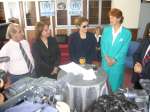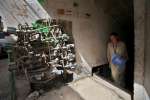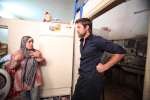Baking camp now home to some 25,000 mainly Kurdish refugees from Syria
News Stories, 3 July 2015
SURUC REFUGEE CAMP, Turkey, July 3 (UNHCR) – The sun offers relentless heat and pitiless light which bounces off soil bleached almost white.
This is the plain of Suruç, home of Turkey's biggest refugee camp. Almost 25,000 people live in UNHCR-AFAD* tents here, and almost all of them are Kurdish and most fled Kobane in Syria when the fighting engulfed the area in September 2014.
At first the refugees were lodged in accommodation centers near Sanliurfa. On January 25, 2014, just four months after the flood of people from Kobane, the Turkish government opened the Suruç Tent City Accommodation Centre, with a capacity of 35,000. It was a remarkable feat of organization.
In the straight, serried ranks of tents the heat is scarcely less inside than outside. A boy opens the door of the small refrigerator supplied by UNHCR, with the tent and sticks his head inside, reveling in cold air, if only for a minute. In other tents people sit like statues, waiting for the sun to set and the Ramadan fast to end.
Mustafa is one of them. He sits and peers out from the flap of his tent. He and his family of 20 fled Kobane last autumn. And today, how is life today?
"Hard. It is hot, very hot here in summer. And we don't have work. I went out and found day work in a couple of places. But then they didn't pay me. There was nothing I could do."
Many of the camp residents try to find work to supplement the monthly vouchers given to each family by the Turkish government for food and hygiene items.
Now Mustafa waits to get advice from one of the camp's 11 Mukhtars, elected by the camp's residents, on his rights and the possibility of finding what he calls legal work.
Rausän has found a way to make a little extra money. While her husband sits with their children on the floor of the tent, she surveys her goods – cigarettes, coffee, children's shoes, sweets, kitchen knives, herbal tea.
In Syria she worked as a tailor and was able to flee with some money. Twice a week now she goes into town to buy the wares displayed at the door of her tent, ready for resale. Business isn't bad, she says. Her business is also a necessity; her husband has medical problems and can't work. What she sells helps keep the family going.
And home? Her mother still lives in Syria but she's not sure how. The family home was leveled in the fighting.
Abdul Kade is an old man of 73, his head wrapped in a white keffiyeh. He leans on his cane, looking lost. He's only been in the camp a month. He fled his home in Raqaa when the fighting engulfed it. He has a six-year-old son Mustafa and to escape they had to hide for three days.
"I'm trying to find out how things work here," he says. He has two older sons, in their 20s, who escaped into Turkey earlier.
And his hope for himself and son Mustafa? To go home, of course. Life as a refugee is very hard. But then he admits that when he phones the numbers of people in his family there, no one answers.
Another old man walks by and announces "only Kobane!", perhaps the only English he knows. It is a statement of hope and defiance, but for the moment it is only the articulation of a dream.
*AFAD -- Turkeys' Emergency and Disaster Management Presidency
By Don Murray, SURUC CAMP, TURKEY











































